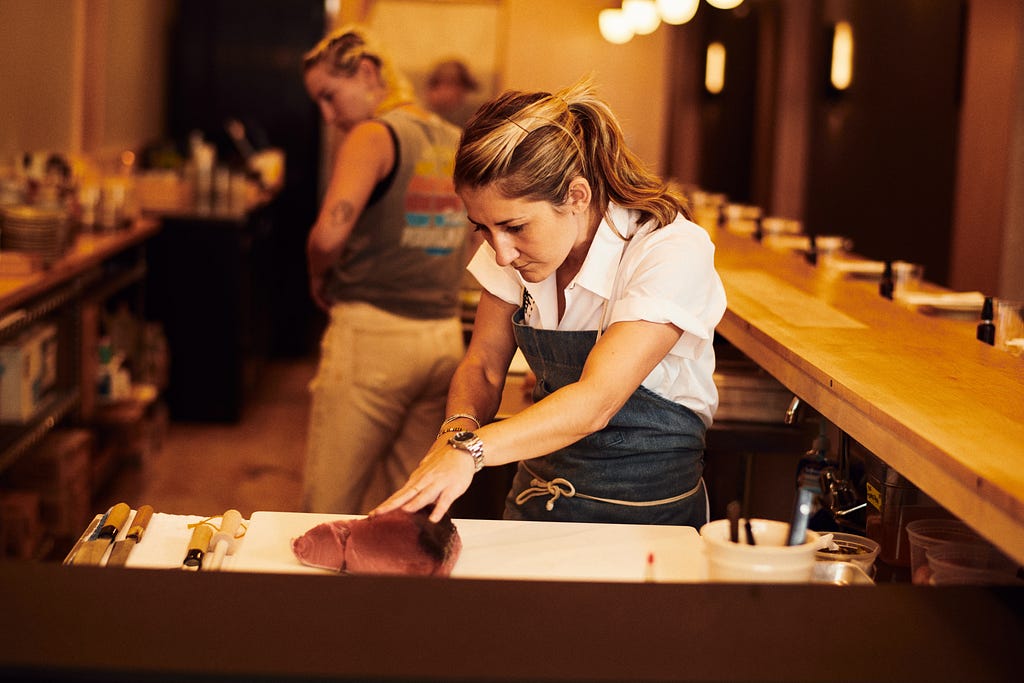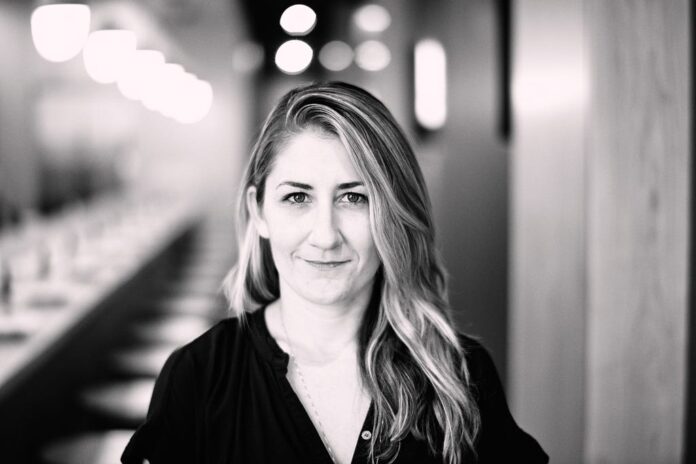Jacqueline Blanchard of Sukeban Restaurant and Coutelier NOLA: 5 Things I Wish Someone Told Me Before I Became a Chef
An Interview With Martita Mestey
Be humble and take criticism constructively. There’s always something to be learned and grow from, and no one likes a hothead or know-it-all.
As a part of our series about the lessons from influential ‘TasteMakers’, I had the distinct pleasure of interviewing Jacqueline Blanchard, owner of Coutelier NOLA and Sukeban restaurant.
Jacqueline is a 10th generation Cajun from Bayou Lafourche in Southeast Louisiana’s Assumption Parish. After getting her bachelor degree in Culinary Arts from Nicholls State University just after Hurricane Katrina, she headed west to join the team of Chef Thomas Keller’s French Laundry and Bouchon in Napa Valley. She later joined the team at Frasca in Boulder, CO in the restaurant’s early years, then went on to a stint at Blue Hill at Stone Barns in New York. She headed back to New Orleans as executive sous chef at Restaurant August for several years, and after a summer cooking in Provence, Jackie joined the team at San Francisco’s highly acclaimed Benu as sous chef where she helped the team earn 3 Michelin stars.
Jacqueline has spent the last 20 years traveling and cooking throughout Europe, Southeast Asia, and Japan to gain a deeper repertoire and a better understanding of each culture’s cuisine — shaping her perspective and respect for global cuisine, in pursuit of being as well rounded of a cook as possible. In 2015, she moved back home to New Orleans to open Coutelier NOLA, a highly curated knife shop focusing on hand forged Japanese cutlery — a business decision she felt was based on the needs of her peers and fellow cooking community of South Louisiana. She and her business partner travel annually to Japan, sourcing the tools of this ancient craft they have come to foster an immense respect and understanding towards.
Their goal is to support and promote the unrivaled focus of the multi-generation craftsmanship executed by Japanese blacksmiths who hand forge professional cutlery and tools for their culinary community. Her love for Japanese culture and cuisine and technique has deepend immensely along the way, and she recently opened her first restaurant, Sukeban in the Spring of 2022.
Thank you so much for doing this with us! Our readers would love to ‘get to know’ you a bit. Can you share with our readers a story about what inspired you to become a restauranteur or chef?
I grew up in a big Cajun family where food was the center of everything. I started cooking at a very young age and it always stuck with me, so I knew I’d pursue it professionally at a young age. I would watch Julia Child, Great Chefs, and Emeril every day after school. Then I would immediately wreck the kitchen trying to replicate what they would make. I have always been art-driven, so this to me was a medium for my art.
Do you have a specific type of food that you focus on? What was it that first drew you to cooking that type of food? Can you share a story about that with us?
Japanese food is my focus. I’ve always had an interest in Asian culture as a kid (I think it honestly started with the Ninja Turtles in the late 80’s, lol). As I traveled and experienced more variety in different countries throughout Asia, I really fell in love with Japan — its deep, storied culture and the immense food traditions that came with it. It all fascinated me. So my focus became what I loved to eat and cook the most, all things Japanese.
Can you share the funniest or most interesting story that has happened to you since you became a chef? What was the lesson or take away you took out of that story?
One of my line cooks got her hand stuck in the pasta machine. While that may not sound funny, looking back on the scene, it was hilarious. We had to pry the machine open with two flathead screwdrivers to get her hand out. She was totally fine, but her fingers were flat when they came out and eventually went back to normal. Lesson learned: don’t take your focus off what you’re doing.
Can you tell us a story about the hard times that you faced when you first started your journey? How did you overcome this obstacle?
I was the only woman in the kitchen and getting passed over for promotions and positions by men with less experience and talent. I continued to keep pushing to make myself seen.
In your experience, what is the key to creating a dish that customers are crazy about?
Textures and temperatures — warm, creamy, crunchy, cold, crispy, bright sensations.
Personally, what is the ‘perfect meal for you’?
A chirashi bowl of warm sushi rice and an assortment of fresh fish and crunchy nori.
Where does your inspiration for creating come from? Is there something that you turn to for a daily creativity boost?
Travel inspires me deeply in my food. It opens your eyes to different perspectives and approaches. We keep a small library of Japanese cookbooks in the restaurant for daily inspiration boosts, but nothing inspires me more than deep travel.
Are you working on any new or exciting projects now? What impact do you think this will have?
Americans need to experience better sake. I am working with small sake producers all around Japan in efforts to allocate better natural sake so restaurants like mine can feature these 300+-year-old sake houses.
What advice would you give to other chefs or restaurateurs to thrive and avoid burnout?
Proper rest is number one — the most important is recovery. It tempers the stress that comes from inflammation.
Take breaks to travel and get re-inspired. Self-care is so important for sustainability in this industry.
Make time for yourself and carve out room to care for your mind and body. Yoga, a massage, a short meditation session, or breathing exercises can all help. It can be challenging to find the time, but carving it out for yourself is essential. Hydrate and try taking collagen supplements for your back and knees.

Thank you for all that. Now we are ready for the main question of the interview. What are your “5 Things I Wish Someone Told Me When I First Started as a Chef” and why?
- Cut the tape! The labeling tape being cut represents attention to detail, that no one ingredient is more or less important than the other.
- Expect monotony! Repetition creates consistency, consistency creates success.
- Edit dishes! Find joy in the simplicity of great ingredients and let them speak for themselves.
- Keep your station clean and your knife sharp. These two things represent you and your work.
- Be humble and take criticism constructively. There’s always something to be learned and grow from, and no one likes a hothead or know-it-all.
- Don’t work at a restaurant that serves brunch! Some may like it, but working Sunday brunch after a Saturday night service is the worst.
What’s the one dish people have to try if they visit your establishment?
Our Louisiana Blue Crab Temaki Roll or our Shiitake Shiso Roll. Everyone loves our rendition of Japanese potato salad.
You are a person of enormous influence. If you could inspire a movement that would bring the most amount of good to the most amount of people, what would that be? You never know what your idea can trigger.
Imparting education about the seafood/seaweed diet that benefits health and longevity. Taking a page from the Okinawan centenarians and their way of life and community that leads to longevity.
Thank you so much for these insights. This was very inspirational!
Jacqueline Blanchard of Sukeban Restaurant and Coutelier NOLA: 5 Things I Wish Someone Told Me… was originally published in Authority Magazine on Medium, where people are continuing the conversation by highlighting and responding to this story.


